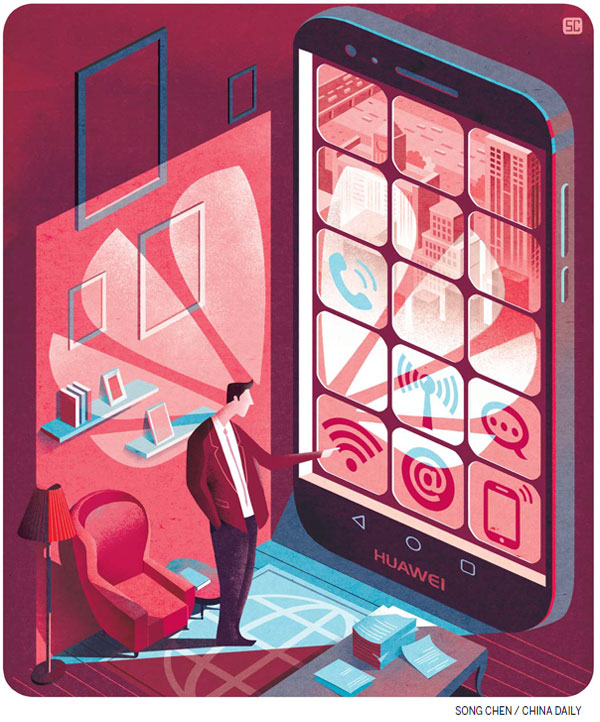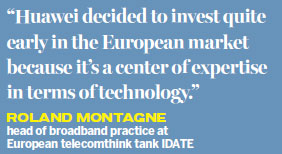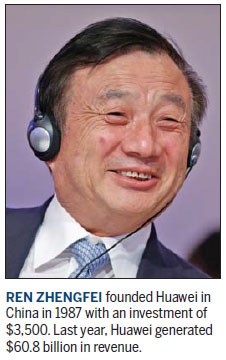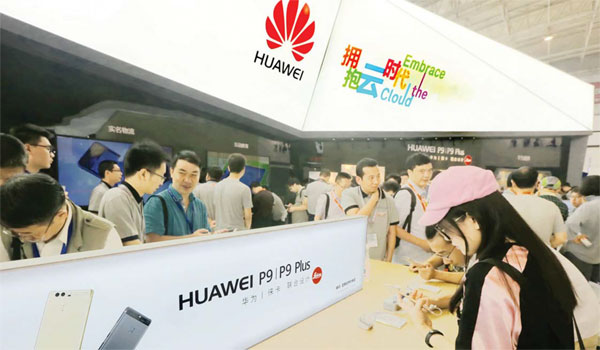Friendly giant
Updated: 2016-11-04 07:28
By Angus McNeice and Dai Tian in London(China Daily Europe)
|
|||||||||
Huawei forms alliances in Europe as it pursues its mission to become leader in innovation
"This is the guts of the business, this is what we do," our guide says, patting a large green, hardware-filled cabinet sitting in the bowels of Huawei's UK headquarters in Reading.
To Britons, Huawei is best-known as a smartphone manufacturer. They may have considered a basic Huawei handset as an alternative to the pricey market leaders, or seen movie stars Scarlett Johansson and Henry Cavill exchanging photo messages using the higher-end P9 in a TV commercial.
Most would be unaware that Huawei plays a key role in the "last mile" technology that delivers superfast broadband to some 20 million homes in the United Kingdom.

"This is where it all begins, the kit that weathers rain or shine, that's driven out to some corner of the world. If this doesn't work, nothing else does," we are told.
Huawei's nuts-and-bolts reliability is what the company built its reputation on. It remains at the forefront of innovation in the industry as the biggest telecommunications manufacturer in the world.
Founded in China in 1987 by Ren Zhengfei with an investment of $3,500, Huawei started as a private reseller of PBX telephone switches. Last year, it generated $60.8 billion in revenue and remains the only Chinese company in the Fortune 500 list to make more money abroad than domestically.
The company announced on Oct 28 that it's on track to meet a sales target of 140 million handsets this year. Western and northeastern Europe are the two fastest-growing markets, expanding at 50 percent year-on-year.
Huawei is the world's third-largest smartphone vendor, and the gap to second place is closing. Market research firm IDC reported in July that Huawei's global market share soared to 8.2 percent in the first quarter of this year from 5.2 percent last year, while Samsung remained around 24 percent and Apple fell to 15.3 percent from 18.3 percent.
Both Apple and Huawei are likely to benefit from Samsung's ill-fated Galaxy Note 7 launch. Its high-end handset has been withdrawn after a series of battery fires.

Analysts offer a wide range of reasons behind Huawei's unprecedented success. The company has a unique management and ownership structure. It's a private, 98.6 percent employee-owned entity run by rotating CEOs. Huawei puts huge emphasis on research - it has invested $38 billion over the last 10 years in R&D, and 45 percent of its 176,000 employees worldwide are engaged in it.
According to Roland Montagne, head of broadband practice at European telecom think tank IDATE, carving inroads into Europe is at the heart of Huawei's global rise.
"Huawei decided to invest quite early in the European market because it's a center of expertise in terms of technology, and it is a dynamic market," he says. "That's why they decided to collaborate quite quickly with the main players in Europe - BT, Orange, Telefonica, to mention a few."
Huawei broke new ground with its partnership with British Telecom in 2005. The Chinese company had set up its first UK offices just two years before landing the game-changing deal.
"At the time, very little was known about it outside of Asia. It didn't really sell very much in Europe," says Mike Galvin, head of technology, services and operations at BT. The British service provider raised eyebrows when it selected the Chinese company among the suppliers to roll out its 21st Century Network, the so-called 21CN data network program.

"We compared Huawei's with others' equipment - yes, you look at the badge on the front and perhaps the heritage of the company it comes from, but you also look at the equipment itself, and we said this equipment meets our needs. It was well-made," Galvin says.
"Were there any special conditions? For every tender we give, there are special conditions. With Huawei we looked very much at security of supply. We are very keen to be an ethical buyer. We sent our procurement inspectors out to Huawei factories, we looked for unethical practices. And we were very pleased with what we found with Huawei."
Like many others involved with Huawei, Galvin attributes much of the company's success to its customer-centered approach.
The unique thing that I would pick out for Huawei that we don't see with any other supplier is how close they are to their customers and how their customers drive what products they produce," he says.
Stefano Cantarelli, chief technology officer and network vice-president for UK and Ireland at Huawei, says gaining the trust of BT opened the door to other major deals the company has cut in the UK and Europe, such as carriers Vodafone and EE. Huawei teamed up with the latter to launch the UK's first 4G LTE (long-term evolution) network.
"What BT represented was the opening of a traditional, R&D-driven operator to embrace a new Chinese vendor in Europe. They have been fundamental in establishing trust, and we were able to get the second-biggest deal we got with Vodafone," he says. "It has been pivotal in creating a brand reputation."
According to Montagne, maintaining trust is imperative for Huawei as the new frontier of the all-cloud transformation and cloud-based strategies offer a fresh set of complex security challenges.
Contact the writers at angus@mail.chinadailyuk.com and daitian@chinadaily.com.cn
|
Visitors test the Huawei P9 Plus smartphone at an exhibition in Beijing in September. The company says it's on track to meet a sales target of 140 million handsets this year. Photos Provided to China Daily |
( China Daily European Weekly 11/04/2016 page1)
Today's Top News
Li promotes SCO bank, free trade
High Court: Parliament must vote before Brexit
Court to instruct how to trigger formal EU exit
Premier emphasizes fight against terror
Italian authorities vow to rebuild earthquake-hit areas
Li arrives in Kyrgyzstan for visit, SCO meeting
Xi affirms one-China policy
France to begin moving migrant minors from Calais
Hot Topics
Lunar probe , China growth forecasts, Emission rules get tougher, China seen through 'colored lens', International board,
Editor's Picks

|

|

|

|

|

|








